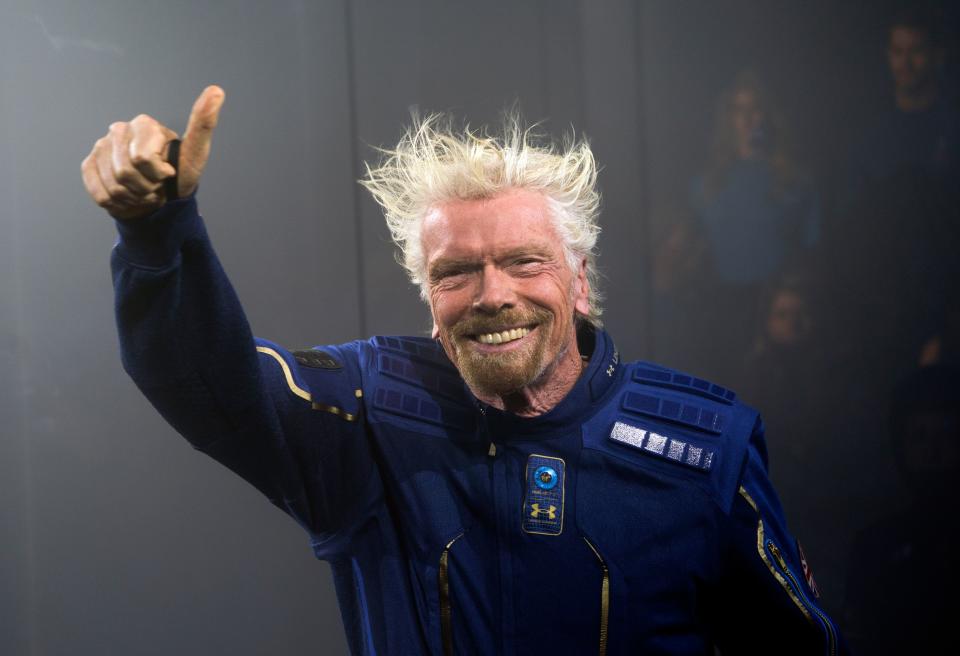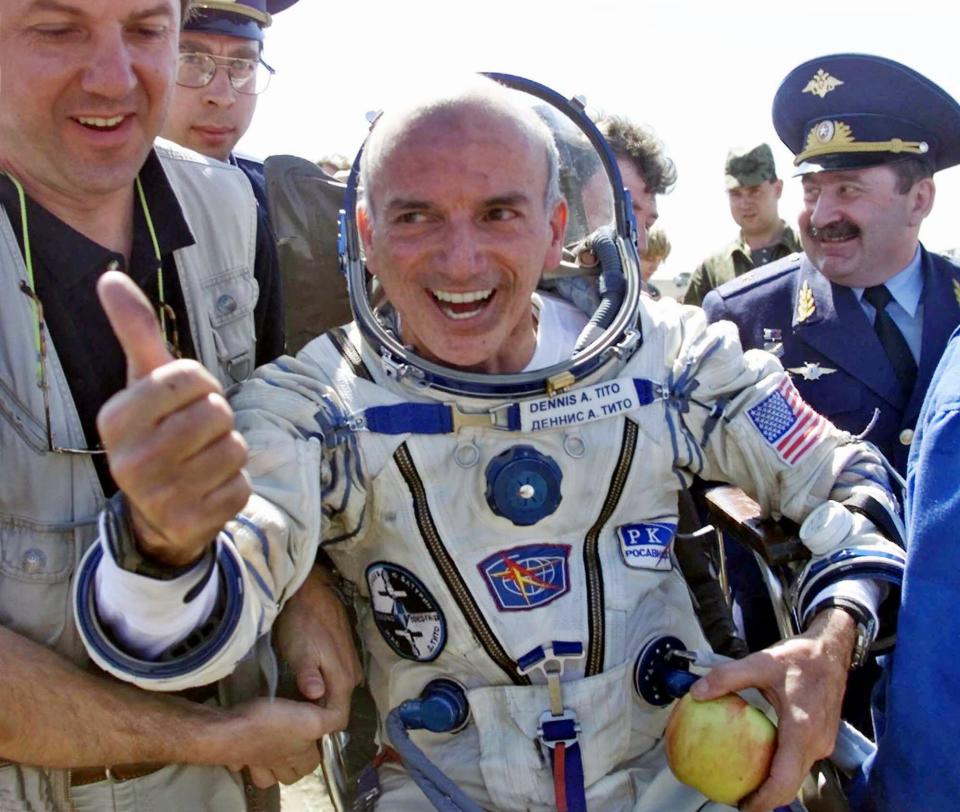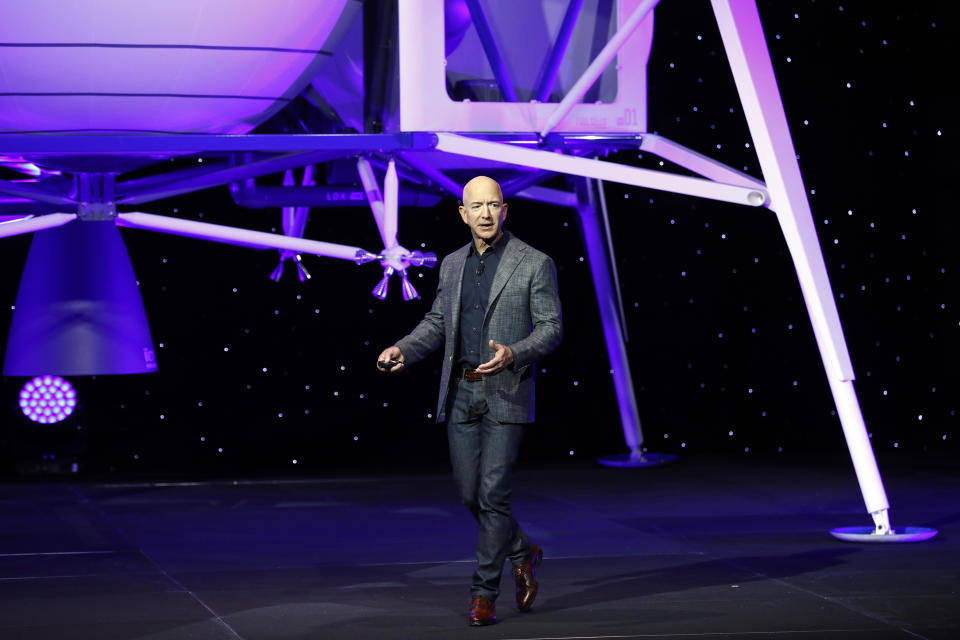The Bezos, Musk and Branson billionaire space race is happening right now
With a presidential election, the Summer Olympic Games in Tokyo and yes, Ludwig van Beethoven’s 250th birthday celebration, 2020 promises to be a humdinger of a year.
But also happening in 2020—if all systems are go—will be the beginning of regular U.S. space tourism flights, either by Richard Branson’s Virgin Galactic (ticker: SPCE) or Jeff Bezos’ Blue Origin or both. Also possibly coming this year are tourist trips to the International Space Station (ISS) on a craft built by Elon Musk’s SpaceX. (Boeing has a spaceship too, but that company might be otherwise occupied.)
So apologies to Donald, the International Olympic Committee (IOC) and Ludwig van, but commercial space travel could end up being the biggest damn thing to happen this year. In fact, I think it’s the beginning of a real game-changer for humanity.
If you’ve been following the space biz, you know that the ‘go year’ has been pushed back a number of times, but Ann Kim, aerospace banker and managing director of Silicon Valley Bank, is feeling it. “These companies are close. They wanted to get humans into space in 2019, but were not as successful in delivering promises as originally thought. 2020 is a good year to see that inflection point.”

It has been a long time coming. In fact these three companies are more or less of the same vintage. Bezos founded Blue Origin (named after Earth, the blue planet, as the place of origin), in 2000. SpaceX, which has colonizing Mars as its ultimate mission, was founded in 2002. And Branson started Virgin Galactic two years after that.
While you may snort at all this silly space stuff, it’s worth noting that three of the most successful entrepreneurs of our lifetimes have been working on space travel for a collective 54 years now. Remember, once upon a time folks laughed at online bookstores, electric cars and branded air travel too.
Yes, there is a bit of a space race going on, although this time it’s not Russia v. the U.S., it’s Branson v. Bezos, who are battling in the suborbital space (pun intended), with Musk as a competitor longer term on more ambitious projects.
Some play down the competitive aspects of the business though. “It’s not a race at all,” future Virgin Galactic passenger Namira Salim told Yahoo Finance’s The Final Round, “we all say that in the industry.” I think it’s safe to say there is room for all three. (Space is a big place, right?)
It’s important to remember that intermittent space tourism has been around for a while. Between 2001 and 2009, seven space tourists traveled to the International Space Station on a Russian Soyuz spacecraft. Dennis Tito was the first, remember him? Also top Microsoft exec Charles Simonyi made the trip. And British singer Sarah Brightman signed up but later canceled. The trips were arranged by a U.S. company, Space Adventures, and cost, gulp, $20 million a pop. But the Russians terminated the program and despite talk of restarting it, haven’t. In any event the Soyuz trips were always one-offs, where Virgin Galactic and Blue Origin aim to be scheduled operations and the first steps to more extensive programs.

Virgin Galactic has been a moonshot of a stock over the past month, up over 60%. Some of that might have to do with CEO George Whitesides telling CNBC recently that demand for tickets “keeps ticking up by a good chunk every month.” The company says it has sold tickets to more than 600 customers at around $250,000 per person. It froze ticket sales after a crash in 2014 killed one of its pilots. Virgin Galactic now says it may reopen sales later this year—and raise prices.
Yes, there is risk. “This is not as safe as airline travel,” says Jonathan McDowell, an astronomer and rocket expert at the Harvard-Smithsonian Center for Astrophysic. “Suborbital flight, [what Virgin Galactic and Blue Origin are doing now] can be made very safe. It will just take a lot more flights and experience to make it so. Whether orbital flight will ever be that safe is more of an open question.” Sir Richard says not to worry. He’ll be going up as Virgin Galactic’s first test-space-tourist astronaut.
‘They will make billions if not trillions in space’
Branson took his company public by merging with Social Capital Hedosophia Holdings Corp, a special purpose acquisition company (SPAC), or blank-check company, founded by Chamath Palihapitiya, a former Facebook executive (who has since somewhat famously soured on his former employer.) Palihapitiya still owns 49% of Virgin Galactic.
Blue Origin—its motto is, Gradatim Ferociter, Latin for "Step by Step, Ferociously.”—hasn’t pre-sold any tickets, but it too has indicated that the time is near to send passengers into space. The company just moved into a swank new 232,000-square-foot headquarters in Kent, Washington—near the Sea-Tac Airport—to house many of its 2,500 employees. Geek Wire reports, “Hundreds more are based elsewhere in the Kent area, south of Seattle, as well as at Blue Origin’s suborbital launch site in West Texas, the Florida rocket factory where Blue Origin’s New Glenn orbital-class rocket will be assembled, and at the site of its future BE-4 rocket engine factory in Alabama.”
Bezos, who loved space as a child, is incredibly passionate about space and Blue Origin, so much so that I pulled these two quotes from this 2018 interview to give you an idea. (The whole piece makes for good reading, btw.)
“I get increasing conviction with every passing year, that Blue Origin, the space company, is the most important work that I’m doing. And so there is a whole plan for Blue Origin.”
And:
“The only way that I can see to deploy this much financial resource is by converting my Amazon winnings into space travel. That is basically it. Blue Origin is expensive enough to be able to use that fortune. I am liquidating about $1 billion a year of Amazon stock to fund Blue Origin. And I plan to continue to do that for a long time.”
Serious!
Imagine if Blue Origin ends up being a bigger deal than Amazon? Could be.

SpaceX is a different beast, not surprisingly playing at an Elon Musk, super-ambitious, Tesla-like level. With its Falcon rockets and Dragon spacecraft, SpaceX was the first private company to go into orbit. Dragon has gone to the ISS 18 times. A Falcon has orbited around the sun. And working with NASA, SpaceX is reportedly set to launch its first crewed Crew Dragon next month. Tourism to the ISS is on the agenda.
Who will launch the first U.S. space flight for tourists?
“I think that Virgin Galactic is the closest,” says Kim. “A lot of people are putting in their deposits. It seems to be the leader of the pack. Blue Origin is close behind. SpaceX has more longer term potential. I think all three can be very successful.”
Where is this all going? “Space tourism needs to be more than billionaires taking selfies in space,” says Tess Hatch, who once worked at SpaceX and is now a vice president at Bessemer Venture Partners, which has invested in the space business. “There needs to be business reasons to be in space.” Hatch says space tourism and the space economy need to catalyze business models, and cites business opportunities such as zero gravity research and pharmaceutical testing.
As for Bezos, Branson and Musk, Hatch says, “...these people made their billions in totally different industries and are now turning to space. They will make billions if not trillions in space.”
I must admit, I have mixed feelings about space being dominated by the likes of Bezos, Branson and Musk. On the one hand I can’t help but admire what they’ve done as entrepreneurs. I don’t think they’re ‘evil.’ And they are filling a breach voided by government’s abdication of having a consistent, strategic space program. So sure, go for it guys!
On the other hand, I worry about the inevitable lack of consensus that accompanies each of these three efforts. How much thinking about pure science, medicine or even art will be brought to bear in space endeavors controlled by billionaires. I guess I don’t blame them or fault them, none of that thinking is necessarily their purview or responsibility.
In a way it’s just another example of our economy and society being co-opted by the technocrat class. Amazon, Microsoft, Facebook, Tesla—those companies are all name-checked in this article. Fifty years ago, yes there were private defense contractors involved in the process, but NASA and DOD were the drivers. The amount of technological innovation and products that came from NASA is stunning and too long to list here. Now the script has been flipped. Will these tech moguls be so free with their IP? Who knows. Maybe they will be even more collaborative about fostering and sharing research and scientific breakthroughs.
One thing’s for sure, it looks like we are going to find out. Maybe starting this year. (Roll over Beethoven.)
This article was featured in a Saturday edition of the Morning Brief on December 14, 2019. Get the Morning Brief sent directly to your inbox every Monday to Friday by 6:30 a.m. ET. Subscribe
Commentary by Andy Serwer is editor-in-chief of Yahoo Finance. Follow him on Twitter: @serwer.
Read more:
Follow Yahoo Finance on Twitter, Facebook, Instagram, Flipboard, LinkedIn, and reddit.

 Yahoo Finance
Yahoo Finance 